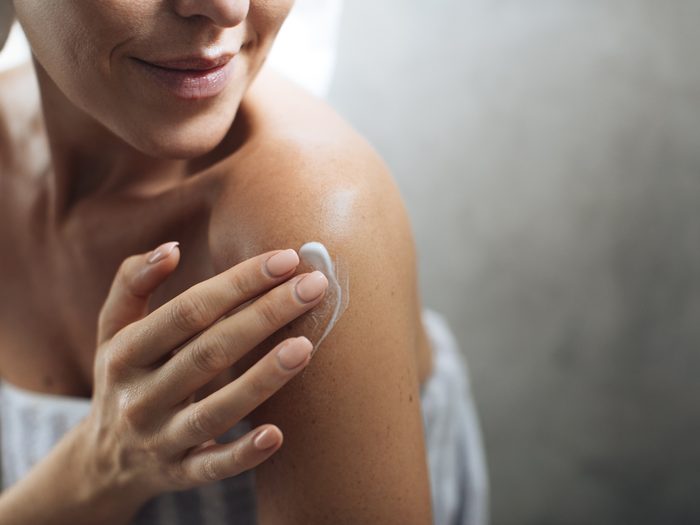
You’re allergic to your fancy body lotion
Many body lotions promise smooth, hydrated skin but some deliver exactly the opposite, giving you red, inflamed, cracked, and painful skin, says Diana Ramos, MD, ob-gyn in Los Angeles and co-chair of The National Preconception Health and Health Care Initiative. The chemicals in many cosmetic products can cause an allergic reaction on your skin—even your breasts if you applied the lotion to your chest—and those can include significant swelling and pain and cause breast tenderness, she explains. Other allergy offenders include laundry detergent, hair products (because they run down your chest when you rinse them in the shower), makeup, and sunscreen. “If you recently changed one of your body products and now you have breast pain, there might be a connection,” she says. “Try removing it to see if the pain goes away.”
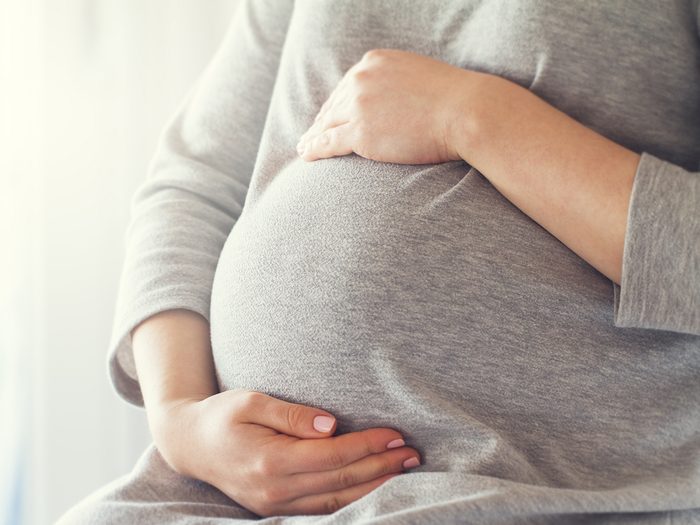
You’re pregnant
Swollen, tender, sore breasts are often the very first sign of pregnancy, Dr. Ramos says. Congratulations! Blame your hormones: In the early stages of pregnancy, your breasts grow faster than your baby. As your estrogen levels increase, they increase the size of your milk ducts, which in turn can increase breast pain and sensitivity, she explains.
Not sure what you should be eating during your pregnancy? Start by making sure to eat enough of these key vitamins and nutrients.
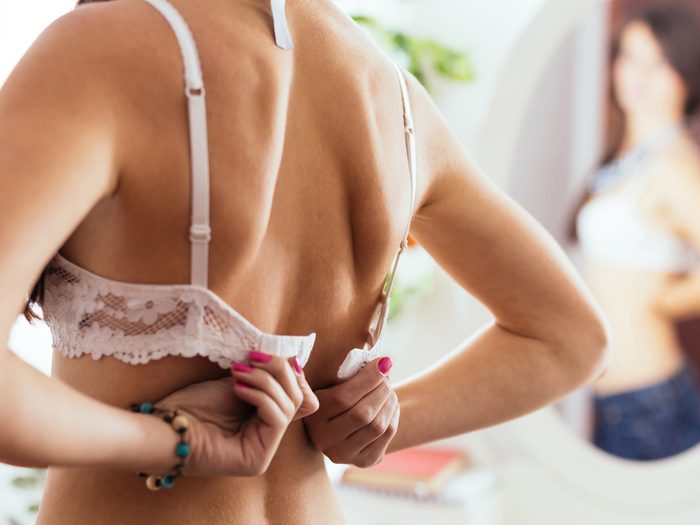
Your bra hates you
Most of us (a whopping 80 percent!) are wearing the wrong size bra, according to a study published in Chiropractic & Osteopathy. And this can cause problems worse than a lumpy silhouette. Poorly fitted bras, abrasive fabrics, and stabby underwire are all common causes of sore breasts, Dr. Ramos says. Instead of enduring 12 or more hours a day in a boob-strangling nightmare, she says it’s worth it to pay a little extra to get something that fits and is comfortable.
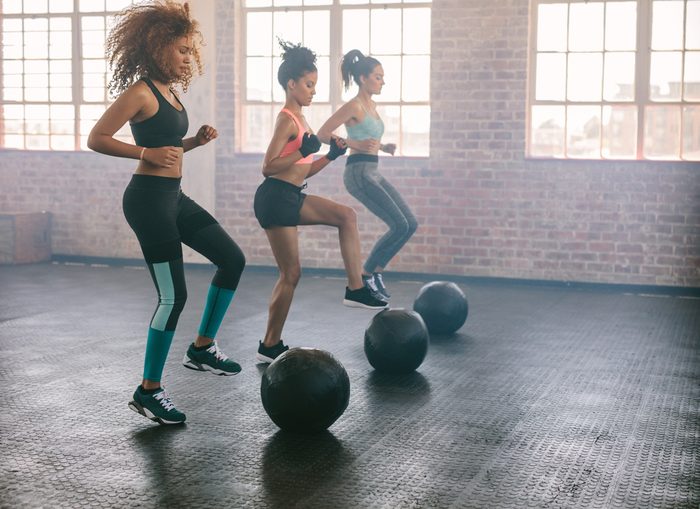
You overdid it at the gym
Exercise is the medicine that cures all ills … except when it causes them. Doing too many chest presses, powering through all the push-ups in your boot camp class, or just going for a long run in an unsupportive bra can leave your chest in serious pain—which can feel like breast tenderness in some circumstances. (Psst: These running tips are just for women.) “The muscle lies directly under the breast tissue so it can be hard to tell the difference between chest muscle pain and breast pain,” Dr. Ramos says. The best indication it’s just muscular? The pain will go away after a few days of rest.
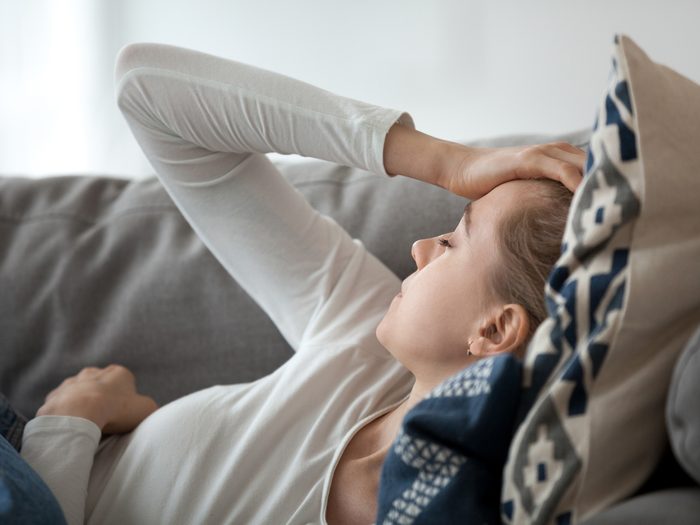
You have an infection
Blocked milk ducts, ingrown hairs (yes, nipple hair is totally normal), clogged sweat glands, and a bacterial illness can all cause localized infections in your breast, Dr. Ramos says. Infections are characterized by redness, swelling, and pain and may also cause your nipple to leak pus, blood, or green, red, or brown discharge. You may also have a fever and malaise. If you think you have an infection you need to see a doctor immediately to help determine the cause and the appropriate treatment.
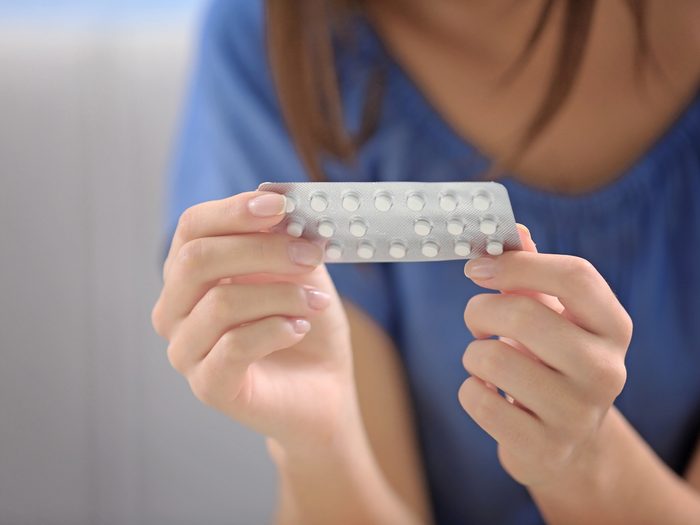
Your birth control
“Any medication that changes your hormones has the potential to cause sore breasts as a side effect,” Dr. Ramos says. The most common culprit is birth control pills as they increase estrogen levels, but fertility treatments, hormone replacement therapies, and thyroid medications can also cause sensitivity, swelling, tenderness, and pain in your breasts. Often this side effect diminishes over time but if it doesn’t it’s worth talking to your doctor about alternative medications.
Plan on switching to an IUD? Here’s what you need to know.
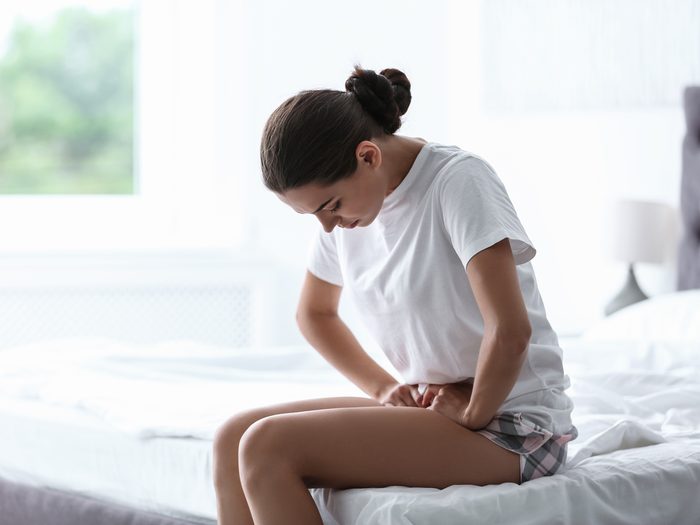
Um, you’re a woman
Puberty, menstruation, perimenopause, and menopause—basically all the stages of the life of being a woman other than childhood—greatly affect hormone levels, so it’s no surprise that a major symptom of all of them is sore breasts. “The most common type of breast pain is cyclical, related to your periods, and is normal,” Dr. Ramos explains. The best way to know if Mother Nature is the cause of your breast pain is to track your cycles and make note of your symptoms so you can see patterns, she says. Also note that the medications most often used to treat the discomforts of PMS, perimenopause, and menopause-like estrogen and progesterone creams or pills—also can cause breast tenderness.
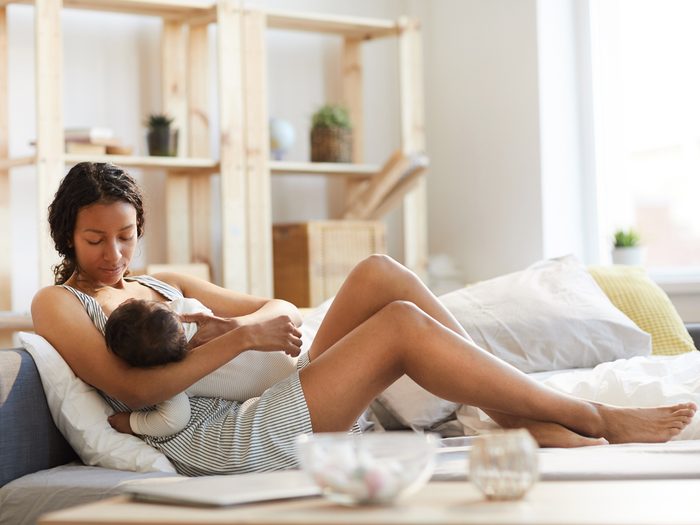
You’re breastfeeding
Your breasts are good for lots of things—sexy times, filling out a sweater, carrying a spare lipstick—but they really have one actual job: feeding a baby. During pregnancy, your breasts and milk ducts enlarge to prepare for being the sole source of sustenance for a whole human being. All this growing means a lot of pain, and that continues even more after your baby is born and actively sucking. A lactation consultant can be a lifesaver for a new mom with two incredibly painful breasts. You can also talk to your doctor.
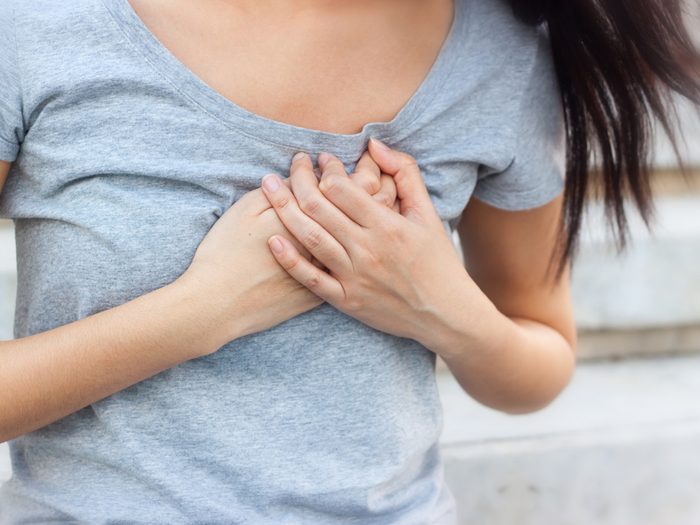
You’ve had a breast trauma
Rare is the woman who hasn’t endured some type of injury to her chest area. Whether it is getting hit with a ball, caught by the seat belt in a car accident, or having a surgical procedure done on your breasts, all types of trauma can leave your breasts aching, Dr. Ramos says. Thankfully most pain from injury goes away quickly but if it doesn’t you should see your doctor to rule out underlying issues like scar tissue adhesions or cracked ribs.
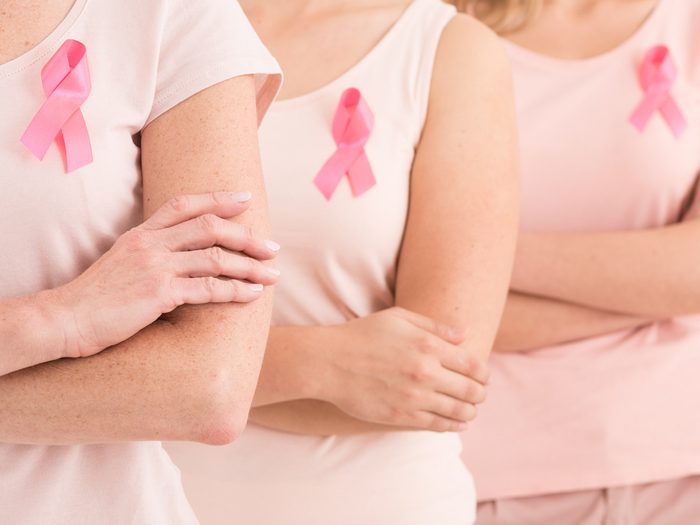
You have breast cancer
This is every woman’s fear, but it’s last on the list for a reason: It’s a very rare source of breast tenderness. While breast cancer may show some outward symptoms like lumps, leakage, or changes in the nipple, quite often there are no obvious signs at all. “The vast majority of women who come in with breast pain do not have cancer,” Dr. Ramos says. “But that doesn’t mean it’s not a valid concern.” To calm your worry and cover all your bases, she recommends talking with your doctor about all your risk factors, getting regular checkups, and most importantly, knowing your body well. “The most important thing you can do for your breast health is to track your cycles and symptoms and pay attention to any changes in your body,” she says. “If something is different, no matter what it is, we want to know about it!”
Next, learn why this woman chose not to have breast reconstruction after a double mastectomy.
